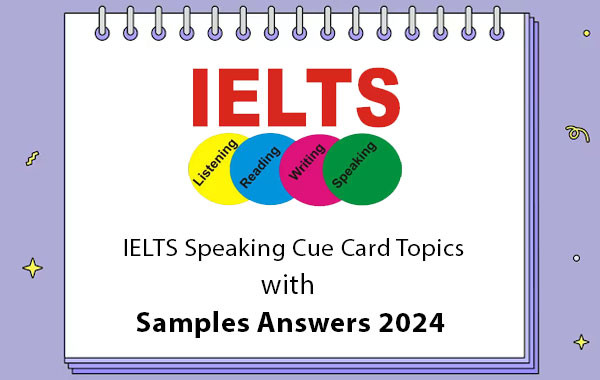Table of Content
Describe an Occasion When You got Incorrect Information
The IELTS speaking test is one of four modules of the IELTS exam. It consists of three stages, during which an examiner will evaluate your speaking ability. These include an introduction, an individual extended turn, and a two-way conversation.
During the introductory round, the examiner will ask broad questions about your life. In the individual long turn round, you will be assigned an IELTS cue card topic and instructed to speak about it. The third section is a discussion round, in which the examiner will ask follow-up questions about the cue card topic.
What You Need to Explain for This IELTS Cue Card Topic: Describe an Occasion When You got Incorrect Information?
This IELTS Cue card topic is frequently asked my so many examiners to know how you feel about your misleading. Let’s check what you need to tell the examiner about your Occasion When You got incorrect information.
Explain:
- When did you get it?
- How did you get it?
- How did you find it was incorrect?
- And how do you feel about it?
Top Sample Answers for IELTS Cue Card Topic: Describe an Occasion When You got Incorrect Information
Describe an Occasion When You Got Incorrect Information: Sample Answer 1
I once experienced a situation where I received incorrect information about a flight I had booked. It was a stressful experience that taught me the importance of double-checking details, especially when it comes to travel.
When Did You Get It?
This happened a few years ago when I was planning to visit a friend in another city. I had booked my flight weeks in advance, and a week before the departure, I received an email from the airline confirming my booking. The email stated that my flight would depart at 10:00 AM. I was happy to see the confirmation and didn’t think twice about it, as I assumed everything was in order.
How Did You Get It?
I got this incorrect information through an official-looking email from the airline. It looked completely legitimate with my flight details, seat number, and even baggage allowance. The problem was that I had initially booked a 6:00 PM flight, not a morning one. At first glance, I didn’t notice the change in the timing because I trusted the email.
How Did You Find It Was Incorrect?
A couple of days before the trip, I had a conversation with my friend about the plan to pick me up at the airport. While discussing the time, I mentioned the 10:00 AM departure, and my friend said that it didn’t make sense because I had initially told her I’d arrive in the evening. This prompted me to check my original booking details. When I logged into the airline’s website, I was shocked to find that my flight was indeed scheduled for 6:00 PM, as I had originally booked. The email I received from the airline had incorrect information about the flight time.
Realizing this, I immediately called the airline's customer service. They confirmed that my flight was still at 6:00 PM, and the email was likely an automated error. Fortunately, the flight details on their website were correct, and I didn’t need to make any changes.
How Do You Feel About It?
Initially, I felt a mix of frustration and panic. The thought of showing up at the airport for a flight at the wrong time made me anxious. If my friend hadn’t questioned the timing, I would have arrived at the airport way too early and would have been stuck there for hours. However, after clarifying everything with the airline, I felt relieved and grateful that I double-checked before the day of travel.
In the end, this experience taught me a valuable lesson about not relying solely on automated emails and always double-checking my travel details on the official website. It also made me realize how important it is to keep my friends informed of my travel plans in case something like this happens again.
Describe an Occasion When You Got Incorrect Information: Sample Answer 2
There was a particular instance at work when I received incorrect information about a scheduled meeting, which led to confusion and inconvenience for both me and my colleagues.
When Did You Get It?
This incident occurred about six months ago. We had a project that required input from various departments, and an important meeting was scheduled to discuss our progress and next steps. I received the meeting details a few days in advance, but it wasn’t until the morning of the meeting that I noticed something off.
How Did You Get It?
I received the meeting invitation via email from my manager. The email contained all the necessary details, including the date, time, and agenda. However, the meeting time listed was an hour earlier than what I had noted previously during our last team discussion. I thought it was a simple mix-up, so I double-checked the previous emails to confirm the timing.
How Did You Find It Was Incorrect?
When I arrived at the meeting room at the time I believed it was scheduled, I found it empty. After a few moments of waiting, I decided to check my email again. To my dismay, I saw an updated invitation sent out by my manager that confirmed the meeting was indeed at the earlier time. I felt a rush of panic as I realized I had misread the information and arrived an hour late.
I quickly checked in with my colleagues who were already in the meeting. They informed me that the agenda had been covered, and we were now discussing the next steps. I felt embarrassed and frustrated that I had caused a delay and had missed important discussions.
How Do You Feel About It?
Initially, I felt a wave of embarrassment and annoyance at myself for not being more vigilant. It was inconvenient for my team as they had to wait for me to join, and I missed out on crucial points discussed during the meeting. However, after the meeting, I spoke with my manager about the confusion. They reassured me that it happens to everyone and emphasized the importance of clear communication.
This experience taught me to always double-check meeting invites and to communicate with my team members if there are any discrepancies. I also learned to take better notes during discussions to ensure I have accurate information moving forward. Overall, while it was a stressful situation, it ultimately made me more organized in my approach to meetings.
Describe an Occasion When You Got Incorrect Information: Sample Answer 3
I remember a highly anticipated event where I received incorrect information about a concert I had eagerly looked forward to attending. Fortunately, the misinformation ultimately turned out to be for my good, as it kept me safe from what became a chaotic situation.
When Did You Get It?
This happened last summer when a popular band announced they would be performing in my city. The concert was scheduled for a Saturday night, and I was ecstatic, having bought my tickets months in advance. A few days before the event, I started seeing posts on social media about the concert's venue and the supposed opening acts.
How Did You Get It?
I came across the incorrect information through a social media group dedicated to music events in my area. Many fans were discussing the concert, sharing excitement, and posting updates. One particular post caught my attention, claiming that the concert venue had changed and that it would now be held at a smaller location. I quickly assumed the information was accurate and told my friends to meet me at the new venue.
How Did You Find It Was Incorrect?
As the day of the concert approached, I decided to double-check the concert's official website for any updates. To my shock, I discovered that the venue had not changed at all; the concert was still set to take place at the original, larger location. Feeling anxious, I rushed to inform my friends about the mistake and advised them to head to the original venue instead.
Once we arrived, the atmosphere was electric, with fans lined up outside, eagerly waiting to get in. However, as we stood in line, things quickly escalated. The venue was far more packed than anticipated, and as we neared the entrance, a commotion erupted. A stampede began due to a surge of people pushing to get inside, causing panic among the crowd. Thankfully, I had made it to the entrance just in time to witness the chaos unfold but was able to back away and ensure I and my friends were safe.
How Do You Feel About It?
Looking back, I feel a mix of relief and gratitude that I caught the incorrect information in time. If I had blindly followed the social media post, I might have ended up at the wrong venue, far from the safety of my friends. The concert’s actual event turned out to be a wild experience, albeit not in the way I had expected. I was grateful that I hadn’t been caught in the stampede and that my instincts to verify information had paid off. This incident highlighted the importance of checking official sources, especially when it comes to large public events. Overall, while it was a nerve-wracking experience, it ultimately reminded me to remain vigilant about the information I consume.
IELTS Speaking Part 3 - Follow-up questions for Describe an Occasion When You Got Incorrect Information
How do you usually verify information before acting on it?
I typically cross-check information from multiple reliable sources, such as official websites, trusted news outlets, or direct communication with involved parties.
Have you ever shared incorrect information with others? What happened?
Yes, I once shared a news article that turned out to be false. I felt embarrassed and quickly corrected myself by informing everyone.
How do you think technology affects the accuracy of information we receive?
Technology can both help and hinder accuracy; while it provides quick access to information, it also facilitates the rapid spread of misinformation.
Can you recall another time when incorrect information led to a misunderstanding?
Once, I misunderstood a friend's message about meeting at a specific location, which led to me waiting at the wrong place for an hour.
How do you feel when you discover you've been misinformed?
I feel frustrated and disappointed, especially if it results in inconvenience or if I acted based on that incorrect information.
What steps do you take to avoid misinformation in the future?
I make it a habit to verify facts through multiple credible sources and avoid sharing information unless I'm certain it's accurate.
In your opinion, what role do social media platforms play in spreading incorrect information?
Social media can amplify misinformation quickly due to its vast reach, making it crucial for users to critically evaluate what they see.
Have you learned anything from the experience of receiving incorrect information?
Yes, I’ve learned to be more cautious about the information I receive and to prioritize fact-checking before acting on it.
How would you advise someone who frequently falls for misinformation?
I would suggest they develop critical thinking skills, check sources, and look for confirmation from reputable channels before believing or sharing.
Do you think it’s important to share corrections when misinformation is spread? Why or why not?
Yes, sharing corrections is vital to prevent the further spread of misinformation and to help others make informed decisions based on accurate facts.




.png)


Leave a Reply